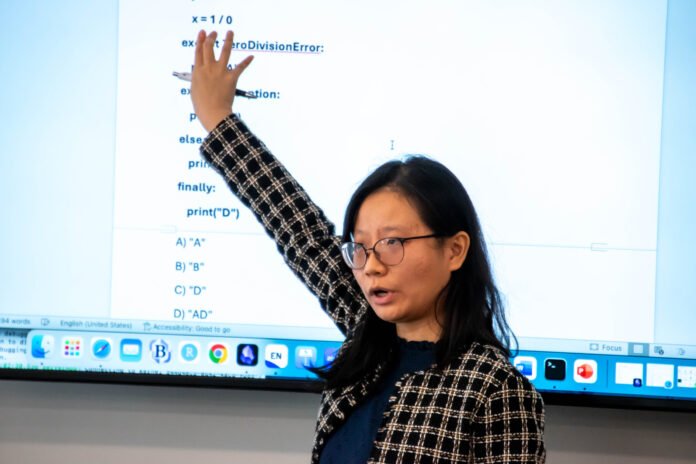Self-driving cars were a fixture in the realm of science fiction just a few decades ago. Now they are becoming more and more part of our reality, thanks in large part to advances in artificial intelligence. This has enormous consequences for the way people live their daily lives.
“If a car could drive itself reliably, the idea of owning one wouldn’t be nearly as prevalent and there would be a lot of space in our cities that we could free up for other things,” says Dr. April Song.
As an assistant professor of information systems and analytics and the inaugural WIPFLI Fellow in Artificial Intelligence, Song spends much of her day thinking about what an AI-shaped future will look like and the role her students will play in shaping it.
Song has been published in leading journals such as the Journal for the Association of Information Systems. She won a Best Paper in Track award at the International Conference on Information Systems, one of the largest academic meetings in the field. Song received her Ph.D. from the University of Georgia in 2024.
TRANSFORMING MOBILITY
Car dependency has been a part of American life for generations. Millions of Americans live in places where cars are a necessity to get to work, school and other essential locations. Owning these cars represents a huge budget burden, while the lack of ownership or driving skills is a significant barrier to personal freedom.
However, this is starting to change. Autonomous vehicle companies like Waymo use AI to power the sensors and mapping functions that make their technologies work. Song sees the current direction of the industry as potentially transformative for society.
“In this new world, people who are now too young or too old to drive will be able to move freely in a way that they can now only achieve by owning a car or depending on others,” says Song.
While basic self-driving technology like cruise control has been ubiquitous for years, Song says recent AI-driven developments have been revolutionary.
“What I see today looks much more promising than what I saw five to 10 years ago,” Song says.
WHAT HAPPENS WITH CODING?
Companies working on these disruptive technologies traditionally compete for gifted computer programmers. However, artificial intelligence has changed the employment landscape. Large language models can now generate code in many programming languages, bypassing a traditional entry barrier in the field of computer science.
Yet the employers Song speaks to all say they still value graduates with coding experience.
“Artificial intelligence is not 100 percent accurate,” says Song. “If you don’t have a good understanding of how to code, you can’t tell whether the answer an AI gives you is true or not. Plus, you’re not just learning a programming language when you study coding; you learn problem-solving skills.”
Marquette’s educational philosophy supports the development of critical thinking and ethical discernment, skills that must be used in combination with technical knowledge to achieve professional success.
MAINTAINING THE LEARNING PROCESS
Song has highlighted an important truth about artificial intelligence to defend this educational approach: the AI doesn’t really think itself. Although these programs can search vast amounts of data and detect patterns, their output is only an estimate of what would happen in that pattern; There will always remain a gap between estimates and facts.
“If you have a complicated problem, ChatGPT may not be able to solve it properly,” says Song.
That is why Song has taken extensive measures to safeguard the learning process in her lessons. Exams are on pen and paper. Any code written with artificial intelligence should include student comments about why they generated it. There is a plagiarism algorithm to detect unethical activities.
Using these guardrails in combination with AI can maximize the classroom experience and prepare students for the future.
“Students should use and explore these artificial intelligence tools, but they should not become dependent on them,” Song said.
To learn more about how the College of Business Administration is using artificial intelligence, go to our website.





